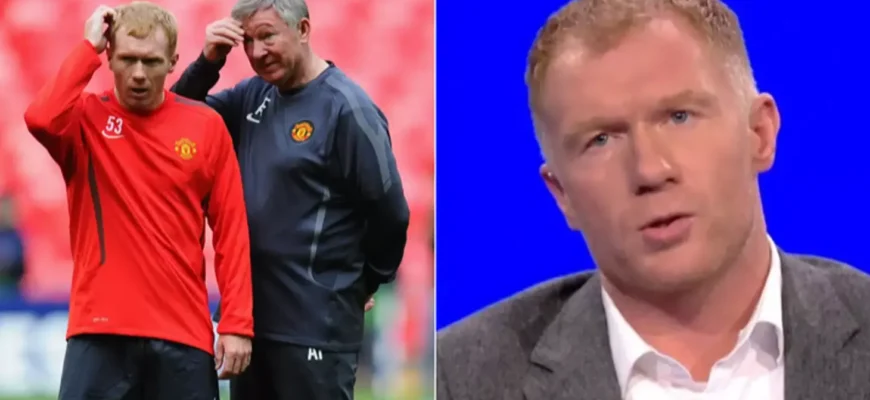A Legend`s Unflinching Verdict
The hallowed halls of Old Trafford have witnessed countless triumphs and, inevitably, a fair share of transfer missteps. Yet, rarely does a pronouncement from a club legend stir the pot quite like Paul Scholes` recent, blunt assessment. The Ginger Prince, known for his incisive midfield play and equally sharp opinions, has declared one former teammate as Manchester United`s “worst” ever signing, a moniker he doesn`t bestow lightly.
His choice? Not a multi-million-pound modern flop, but a name from a bygone era: Mark Bosnich. And the reasoning behind this rather startling selection cuts deep, highlighting values that, perhaps, have become scarce in today`s footballing landscape.
The Case Against Bosnich: Unprofessionalism at Its Peak?
Scholes` condemnation of Bosnich wasn`t merely about performance on the pitch – though that certainly played a part. It was, fundamentally, about professionalism, or rather, the stark absence of it. “He was so unprofessional,” Scholes reportedly stated, painting a vivid, if unflattering, picture of a player who struggled to meet the rigorous demands of Sir Alex Ferguson`s era. Imagine a goalkeeper, after a mere three shots in practice, already “knackered.” One can almost hear the exasperated sighs of coaching staff and the pointed glare of a certain Scottish manager.
Then there`s the almost comical revelation: Bosnich “couldn`t kick a football.” For a modern audience, this might sound like a playground jest. But for a professional goalkeeper, especially one meant to follow in the colossal footsteps of Peter Schmeichel, it was a fundamental deficiency. Scholes` candidness brings a dry, almost ironic humour to the situation, suggesting an incredulity that still lingers decades later. This wasn`t just a poor transfer; it was, in Scholes` eyes, a gross mismatch of talent and temperament with the club`s ethos.
Cost Versus Calamity: Redefining “Worst”
In an era where astronomical transfer fees dictate narratives, Scholes` pick offers a refreshing, albeit brutal, counter-argument. Recent years have seen Manchester United splash eye-watering sums on players who have, to put it mildly, underperformed. Jadon Sancho, reportedly a £73 million acquisition, and Antony, another £80 million signing, are often cited in contemporary discussions about the club`s most regrettable transfers. Their struggles are well-documented, their weekly wages a painful reminder of shattered expectations.
Yet, Bosnich arrived on a free transfer from Aston Villa. Logically, a free player, no matter how ineffective, should cause less financial pain than an £80 million one. This is where Scholes` definition of “worst” transcends mere economics. For him, it appears to be less about the fiscal outlay and more about the qualitative impact – the dedication, the attitude, the very fabric of professionalism that underpins a successful team. A player who undermines the training ground culture, regardless of their price tag, might inflict a deeper wound on the club`s spirit than one who simply fails to justify a huge fee.
The Shadow of Schmeichel and the Weight of Expectations
Bosnich`s unenviable task was to succeed the legendary Peter Schmeichel, a goalkeeper synonymous with United`s treble-winning glory. Stepping into those colossal gloves was a monumental challenge for any player, let alone one described as “unprofessional” and technically limited. Fabian Barthez, who eventually replaced Bosnich and enjoyed a more successful spell, winning two Premier League titles, underscored the gap in quality and mental fortitude required for the role.
Scholes` comments serve as a stark reminder of the immense pressure inherent in playing for Manchester United. It`s not just about talent; it`s about character, resilience, and an unwavering commitment to the highest standards. Players are judged not only by their peak performances but also by their consistent effort and embodiment of the club`s values.
An Enduring Legacy of Scrutiny
Ultimately, the debate over Manchester United`s “worst” signing is subjective and likely to rage on for as long as the club exists. Is it the player who cost the most and delivered the least? Or is it, as Scholes suggests, the one who demonstrated a fundamental lack of professionalism, regardless of their transfer fee?
Paul Scholes` unvarnished opinion pulls back the curtain on the often-hidden aspects of football – the daily grind, the commitment, and the attitude behind closed doors. It`s a testament to the old-school values that built dynasties and a cautionary tale for modern players. In a world increasingly obsessed with transfer market valuations, Scholes reminds us that some contributions, or lack thereof, are measured not in millions, but in the less quantifiable currency of dedication and respect for the game.









